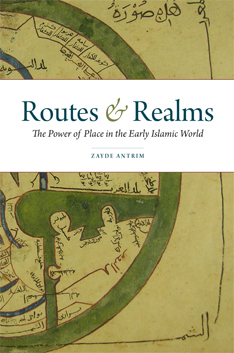 As a complement to popular scholarship on globalization, a new book by Associate Professor of History and International Studies Zayde Antrim explores the historical significance of identities formed through attachments to geographic locations.
As a complement to popular scholarship on globalization, a new book by Associate Professor of History and International Studies Zayde Antrim explores the historical significance of identities formed through attachments to geographic locations.
Published in September, Routes and Realms: The Power of Place in the Early Islamic World (2012, Oxford University Press) examines early texts produced by Muslims during the ninth through eleventh centuries, paying specific attention to how the authors conveyed attachment to the lands in which they lived. This attachment created what Antrim describes as “widely resonant categories of belonging.”
“Representing plots of land as homes, cities, and regions in texts…was a powerful way to claim loyalty, authority, and belonging in the early Islamic world,” said Antrim, who teaches courses on Islamic civilizations, Middle Eastern history, nationalism, and geography. “I have always been interested in geography and the ways in which the geographical imagination shapes the way we see and act in the world.”
 The information contained in these millennium-old texts may help us better interpret current events in the Arab region. Antrim points out that Western analysis of these events de-emphasizes individual and cultural ties to physical locations and instead promotes a characterization of Arabs and Muslims as motivated by kinship and larger religious affiliations.
The information contained in these millennium-old texts may help us better interpret current events in the Arab region. Antrim points out that Western analysis of these events de-emphasizes individual and cultural ties to physical locations and instead promotes a characterization of Arabs and Muslims as motivated by kinship and larger religious affiliations.
“Political rhetoric about the global dimensions of the ‘War on Terror’ is dominated by the threatening figure of the ‘Muslim terrorist,’ loyal only to a worldwide network of like-minded Muslims committed to otherworldly and utopian (or dystopian) goals rather than local, national, or geopolitical agendas,” Antrim says. “These assumptions have distracted from the modes in which territories, imagined in new ways and deployed in new forms of discourse, have retained wide relevance in the geographical imagination as well as on the ground in the late twentieth and twenty-first centuries–not just among Muslims or in the Middle East, but everywhere.”
Antrim was interviewed about Routes and Realms for the spring 2012 issue of The Trinity Reporter. Read the full interview here.




